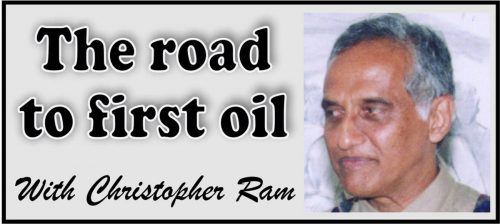In the previous column in which I examined whether Guyana was prepared for First Oil in 2020, I wrote that the situation is not irretrievable but that “there need[ed] to be manpower changes and more leadership from the President.” I suggested that President Granger needed “to take charge before it is too late.”
As if on cue, the President was reported on the same day expressing a high level of confidence that “by the end of August or thereabouts the Guyanese people will see a Department of Energy with which they are satisfied”. This of course is not the first time that the President had set a timeline for the development of the sector and one recalls that very confidently on 11 April of this year the President had indicated that “by the first of May there will be some further announcement but right now the preparatory work is being done.”
Anyone familiar with management knows only too well of the consequences of deadlines and critical activities not met and the challenges which they later pose. At a talk I gave to an enthusiastic and engaged group of Guyanese in London last week, I identified some of the critical matters to be addressed and their current state.
Before engaging in elaborate details however, I think that a primary requirement is for the Government to formulate and articulate the objectives for the sector and hopefully to canvass views and comments on its preferred model. That exercise does not appear to have commenced.
Thereafter, some detailed and sometimes tedious work will have to be undertaken. Here are some of these.
Department or Ministry
It appears to have been well settled that portfolio responsibility for the petroleum sector would be removed from AFC Leader Raphael Trotman. In fact, Mr. Trotman had so resigned himself to this eventuality that he had indicated to the press that he would not be engaging on the sector. It was also reported that the functions previously carried out by the Ministry of Natural Resources would be transferred to the Ministry of the Presidency and the indications were that a new department would be created in that Ministry.
That seems to be a rather odd arrangement. While it must be acknowledged that until the details are made known and the changes gazetted, no definitive pronouncement can be made on the proposal, it is quite difficult to see how a Department in the Ministry of the Presidency will be structured and organised to carry out the wide-ranging functions overseeing a sector and industry that by 2022 will likely account for 60% of Government revenues.
Some serious organisational planning embodying and defining the hierarchical and horizontal relationships to make the entity operate seamlessly is unavoidable. It will be necessary to structure the Department along some functional lines, defining what those functions will be and establishing an Organisational Chart identifying the skills and expertise required. This requires consultants with expertise and experience both in the sector and in administration and is a task that should already be in progress.
Systems
Good systems are critical for delivering organisational goals, including efficiency, results, accountability and transparency. Perhaps not unfairly, the sector is synonymous with corruption and it is important that there are adequate checks and balances in the system to prevent or detect improprieties. Manuals will have to be prepared and rigorously tested to ensure that they are resilient enough to cope with both foreseen and unforeseen eventualities.
While both the form and the systems can be addressed concurrently, the skills required are different and the process will be long and tedious. It will also cost money.
Personnel
The identification of relevant and appropriately qualified staff is another critical function. No matter how well structured the organisation is or how comprehensive and robust the operations manuals or procedures are, unless high quality staff can be recruited in an independent and professionally executed process and are retained through good and rewarding employment practices, the system will malfunction and add to the cost.
One issue to be addressed is whether the chief executive officer (by whatever name called) needs to be recruited upfront to participate in the design of the organisation and its system. This has both advantages and risks since the person is likely to develop an organisation and systems more suitable to his/her preferences than that which is necessary for the interest of the country.
There is always talk about world class this and that for the sector and there is likely to be the additional challenge whether such a person would feel comfortable in being part of any Ministry. The Government may wish to consider that there is hardly any evidence of this kind of model in any country in which petroleum constitutes a major part of the economy.
Petroleum Commission
Minister Trotman had for some time been particularly keen on the establishment of a Petroleum Commission for which he tabled a Bill in the National Assembly. There has not been much talk of this recently or whether the Government’s thinking is to pursue this alongside the Department. My view is that they ought to be two separate bodies but this would require that their form, structure and functions be considered simultaneously.
This column has been critical of the drafts of the Bills published so far, particularly with respect to their underlying concept of a nearly all-powerful Minister who appoints and then lords over the Commission. The Government has not signaled any willingness to revamp the model which seems unlikely to serve the best interest of the country.
Legislation
One of my biggest disappointments is that the Cabinet which includes several lawyers has not made any amendments to or repealed and replaced the existing statutory framework which therefore remains outdated and inadequate. These are:
► The Constitution (of course).
► Petroleum Production Act, Cap. 65:05 (down to two sections)
► Petroleum Exploration and Production Act Cap. 65:04
► Petroleum (Exploration and Production) Regulations 1986 (Regulations 5 of
1986).
What is particularly troubling is that apart from Local Content legislation which can be made under the existing Act, the Government has not articulated any legislative intent or agenda for the sector. It is equally bad whether this is a sign of satisfaction with the status quo or a confused state of mind.
Fiscal framework
There does appear to be a misunderstanding and therefore misapplication of the fiscal framework which even the IMF seems to have got wrong. Barring any Order made under section 51 of the Petroleum Exploration and Production Act, the tax laws of the country apply to petroleum companies as they do to any other company or business.
What section 51 of the Act does is permit (but not require) the Minister of Finance to make an Order, subject to affirmative resolution of the National Assembly, modifying specified tax laws in their application to companies which enter into production sharing agreements with the Government.
As noted in parenthesis in the preceding paragraph, the Minister is not bound to modify the tax laws: he is only permitted to and even this is subject to affirmative resolution of the National Assembly. Since the 2016 Agreement was made post-discovery, a cautious approach by the Minister of Finance would at best have reduced but not eliminated any obligation to make an actual payment of taxes.
Failure to understand and apply this section by the Government could cause the country hundreds of dollars of squandered tax revenues each year. Just imagine: the rest of the economy will have to make up for the taxes which the Government has given away.
Unlike the IMF, I do not think section 51 needs to be replaced: it simply requires sensible application and use.
To be continued.







